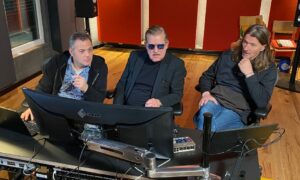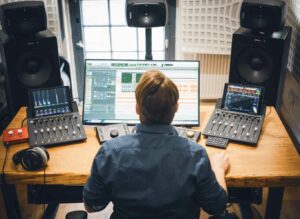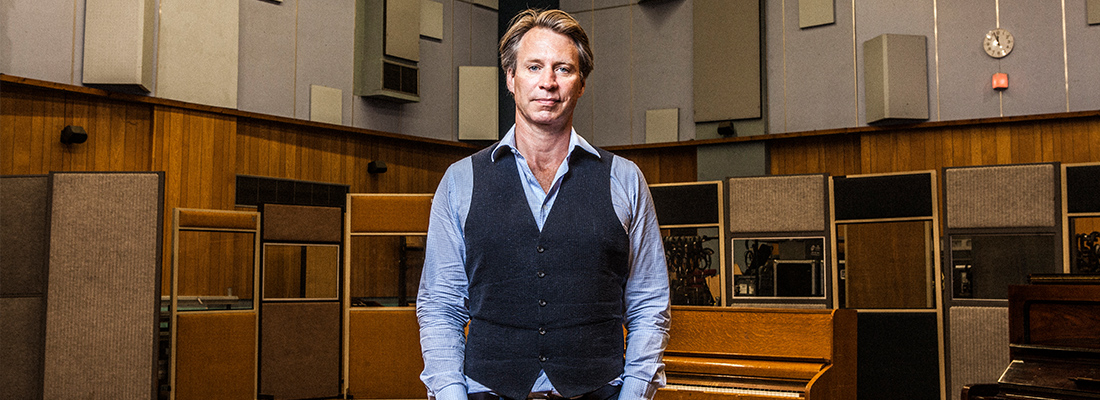
“Blu-ray is the best way to listen to immersive audio.”

We gotto speak with the British music producer, composer and
multi-instrumentalist Giles Martin about his work, especially focusing on his experiences with with immersive audio .
Martin is the head of audio and sound at Universal Music Group and has been in charge of delivering new immersive mixes like The Beatles’ “Abbey Road” and The Rolling Stones’ “Goats Head Soup”.
Due to your family situation, you have certainly been confronted with working in a recording studio at an early stage. Could you give us some insights into your biography, how you found your way to the music?
Being the son of music production legend George Martin, the now fifty-one-year-old has always had a connection to music and music studios.
“I was aware of recording studios from the age of two or three, because I used to run around – my father had a studio in Oxford Circus in London called Air studiosand I used to go and visit him there. I remember I much preferred that building to his office, because it had a hot chocolate machine and it was more fun. So, unlike most other kids I was aware of recording studios.”
But at first, it did not seem, as if Giles’ career was going to go into themusical direction – a direction his father didn’t want for him in the first place.
“I was going to become a car designer, I was good at physics and art. But then I fell in love with music when I was about eleven or twelve, I fell in love with writing and the piano. But my father was very keen on me not to do music for a living. I remember I said to him when I was fourteen: “I want to do music” and he goes: “You’re just not good enough” and I remember thinking at the time: “I’m gonna show you”.”
When George Martin started losing his hearing, Giles remembers:
“I ended up being his ears and I remember listening for him. (…) He wouldn’t tell anyone that he was going deaf, but by the end of his life he was very deaf. And so, I learned what frequencies were and what compression was and all of those things. I went through a stage of thinking I want to write and compose music and I still do that to some degree, but I suppose genetics and circumstances met for me to end up doing what I’m doing now.”
Having a famous father meant for Giles Martin, that he would be watched very closely especially at the beginning of his career in music.
“It was like having a microscope on me (…) – you can’t be average. You either couldn’t get a proper job so you did what your dad did, or you’re the second coming and you’re some genius, there’s no middle ground. And you learn to navigate that and you try to tell people that, actually you are average and you’re not one or the other. But I think, without any question, I had huge privilege and opportunities.”
As it’s really difficult with the current Covid19 situation, how do you experience this situation within your creative surrounding?
During the first lockdown Martin created a home studio to work in and says he got a lot of great and creative work done, “because I was locked in and had no distractions.”
But it also made the working process more secluded.
“I miss the collaborative process; I miss the walking into a room and being able to hear something or having people walking into a room and seeing how they react to what I’m doing. (…) You can really tell what something sounds like of what you’re doing by someone’s reaction. And because you don’t have that reaction, you don’t really know. You work in a bubbleand that’s hard.”
Martin also says, that most of the creative projects, like films, albums and even a Broadway show, have been pushed back to the next year, which resulted in “less creation going on”.
Creation that would usually take place in the famous Beatles’ studio Abbey Roads studios.
Abbey Road studios are a magical place for us. What was it like for you to work in those studios?
“As soon as you take it for granted, that you’re in this amazing building where some of the most incredible music is being made, then you shouldn’t be there. As soon as you think you deserve it, you shouldn’t be there. And so, I try and makeevery day fun andI try to make every day creative . And my father was the same. We’re not saving people’s lives, we’re not putting out fires, we are working in a luxury sector. Music is important to us but it’s not like water or food and so, we should romanticize it and we should enjoy it and we should feel lucky. Hopefully that’s what people who work with me feel as well.”
Music listening experience has moved from mono to stereo to multi-channel. At the beginning of the millennial the SA-CD was already a medium that made it possible to experience multi-channel sound but this has not really caught in the market. With the new immersive formats, such as Dolby Atmos, this seems to be different. More and more products are being mixed accordingly and released on Blu-ray. What were your experiences when you started mixing productions in Dolby Atmos?
““I would go back to 5.1, because I think that 5.1 and Dolby Atmos are very related in processes – Dolby may disagree though. So, I suppose first real experience with immersive audio was the LOVE show and the LOVE album [The Beatles]. That was the first 5.1 album and actually one of the best we did. That was because I got a chance to build a theatre in Las Vegas which has seven thousand speakers in it. So, I was doing Dolby Atmos before Dolby Atmos did Dolby Atmos. We had a room with speakers in the ceiling, speakers in the chairs and speakers in the stage. (…)
I then came back to Abbey Road and made a 5.1 album of it and I just thought it was beautiful. It was a beautiful work process; it was beautiful to put someone inside music. (…)
When Dolby Atmos came along, I was fairly early. I think I did the first album in Dolby Atmos, which was Sgt. Pepper’s, which we did as a theatrical thing and didn’t get released, I did that as an experiment. (…) For me it was an extension of the Love Show, I was doing the same thing. I was creating an immersive sound field.”
Martin further explains that, when working with new technologies like Dolby Atmos, you have to “be careful not to become a slave to technology” and not use the technology simply because it’s available, but because it makes sense.
He also adds that the working process isn’t just with technology, but an interactive process with other people.
“And the great thing about my life and the people I work with is, while we all respect each other, we disagree. Bob Clearmountain, who is a good friend of mine, he likes to mix vocals sometimes right or left and I don’t like that, I like it to be the center of the performance. And neither of us are right, I think he’s one of the best mixers of all time, we just disagree.”
Martin sees the immersive audio as a way to create hyperreality when mixing “EDM and crazy stuff, but if you got a voice and a guitar, what it’s good for is reflections.” He adds that
“Blu-ray is the best way to listen to immersive audio.”
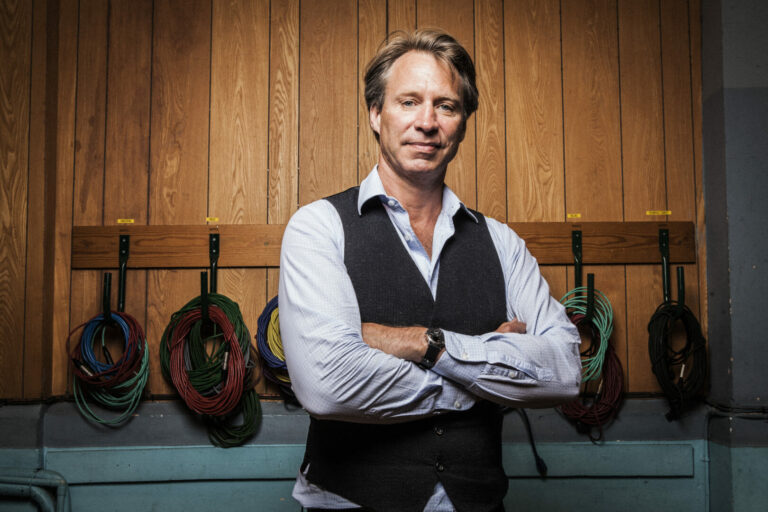
You’ve been appointed as head of audio and sound at Universal. Streaming is the most common way to consume music today The quality of today’s studio recordings, including multi-channel options, is hardly accessible to most consumers. The physical media format Blu-ray offers a great alternative for enjoying music at home in the highest quality. How do you see the development between streaming subscription models and purchased old products, also under the aspect of the future financing of music productions?
“I think the first thing I would say is, that the consumernever had it sogood, because they have options. Us old people sit and complain about the good old days, but the good old days weren’t all that great. Now, on my smart phone I can have all the music in the world and I can hear it and I can enjoy it. And I don’t believe that, despite being a proponent and an expert in audio quality, I don’t believe bad audio quality will destroy your enjoyment of a good song. We listened to AM radio and the cassette walkers growing up and their sound is worse than the music on my phone. And you can fall in love with a song coming on AM radio.”
Martin then goes into detail about the future of music production:
“The music industry has to understand that convenience wins. We can’t change that, convenience for the consumer wins. So, what we have to do is, we have to match that convenience with technology. (…) I think technology will bring the level up as it’s always has done – as it has done with television, with phones, with everything else – so I think that Blu-ray will be in a situation where you have to match the output source that you’re listening to. (…) And then as time goes on, that will improve and the products will improve.
What I’m not keen on doing is telling people “You shouldn’t listen to this, because it’s bad” because it’s not true. People should listen to how they want to listen to it and they will do it. So, I think to answer your question, I would love – and I’m passionate about it – I want people to be able to hear [tollen Sound in Musik][great sound in music] in their home. And I think we’re getting there; I think it’ll just get better. So, I’m interested in people experiencing great sounding music without realizing they’re actually doing it. (…) What we all really want, is everyone to enjoy it.”
Music recordings that are conceived immersive from the beginning will certainly influence the future way of recording music. What do you think are the most important points to achieve an optimal result for an immersive audio product?
“It depends on what the music is. If it’s real, like performance or bands I would say the most important thing is to catch the room. So, you feel as if you could be in the room with the artist. It’s making sure you catch the walls. Catch the performance as good as you can, as always, but make sure you capture the walls. So that would be the rule I would say.
And then, when it comes to EDM and dance music and non-real music, it’s really a question of making sure that the balance and relationship of what you have in your spectral space and your spacial space doesn’t distract you too much.”
The Beatle’s album Abbey Road is one of your works in the Dolby Atmos format. How did you feel about the process and the result from the original recordings to the immersive sound dimensions in Blu-ray?
Jokingly Martin answers: “I mean, obviously I feel good about it, otherwise you wouldn’t be hearing it!”
The he goes into detail of the working process for Abbey Road:
“There’s no such thing as audio perfection. (…) If you take, for example, “Golden slumbers” of Abbey Road or similar to that “You never give me your money”, which have orchestra in them, it’s just a mono recording with the orchestra, and they’ve gone through a TG-desk and they’re compressed and they have this little steady, honkey sound to them – it’s not this big sound, it just sounds big because we fill in the blanks – as a stereo format that’s great because you get that beautiful sounding record. But it’s not perfect, so when you start pulling it apart for Dolby Atmos, you want to make sure that people don’t hear those imperfections and the experience is still the same. So quiet often, we make things less perfect, than they are, so that the feel of the record is the same.
perfect, than they are, so that the feel of the record is the same. I’ll give you an example, that I was lucky to learn early on: I mixed “I am the Walrus” for LOVE, which was the first Beatles song I did about fourteen years ago, and I just thought it was great! And I listened to the original and the original sounded horrible, but sounded better – because it was claustrophobic, it had that feel to it. And that’s the thing, it’s like paintings. Great paintings aren’t necessarily complete facsimile of what the subject matter is and records are the same. And so, I want for a Dolby Atmos mix to be a beautiful veil that wraps around them and they are familiar [with], but at the same time they’re experiencing something different
There’s nothing much wrong with Abbey Road to begin with, but I want the Atmos experience to be enveloping. We do a lot of techniques, but the essential DNA of the record is preserved. I want it to be Abbey Road, but more than you remember.”
The Dolby Atmos mix on Blu-ray is part of the Super Deluce Edition “Abbey Road – 50th Anniversary” which also includes a new stereo mix and two additional CDs with twenty-three unreleased session and demo recordings – available here in our shop.
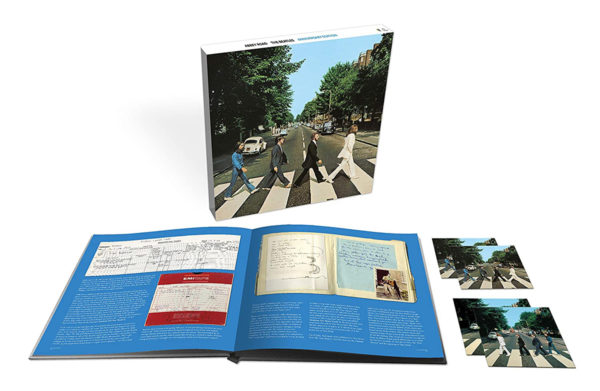
The soundtrack “Rocketman” as a music film was produced by you and appeared in multi-channel mixes, also in Atmos. How different is the working process for pure studio albums and for music or concert film productions?
“In a wayRocketman was more like the Love Show, because I was creating sounds for it. And so, I could do things like, Rocketman the song itselfwas this big production number where Taron, who plays Elton, commits suicide in a swimming pool and he gets his stomach pumped and gets up on stage and then he shoots up into a plane. I used two full orchestras on that. So, I’m creating a sound field which I know I can put into immersive space opposed to being given – the difference is like when cooking being given the ingredients to make something or finding the ingredients yourself. (…) When he dove into the water, I was trying to get that effect of when your ears click, because I knew in the space people would notice. And I put some whale sounds on there as well and you can just go crazy.”
While on the one hand Martin had more freedom to experiment with sound, he also had more responsibility for Rocketman.
“It’s more challenging because with Rocketman I’m completely responsible for everything that happens, but at the same time it gives me a palate to work with. And I said to Dexter, the director: “Listen, just let me do stuff and the fun thing about music is that I’ll get it all wrong and then I’ll get it all right!””
The movie Rocketman with Martin’s soundtrack is available on Blu-ray here in our shop!
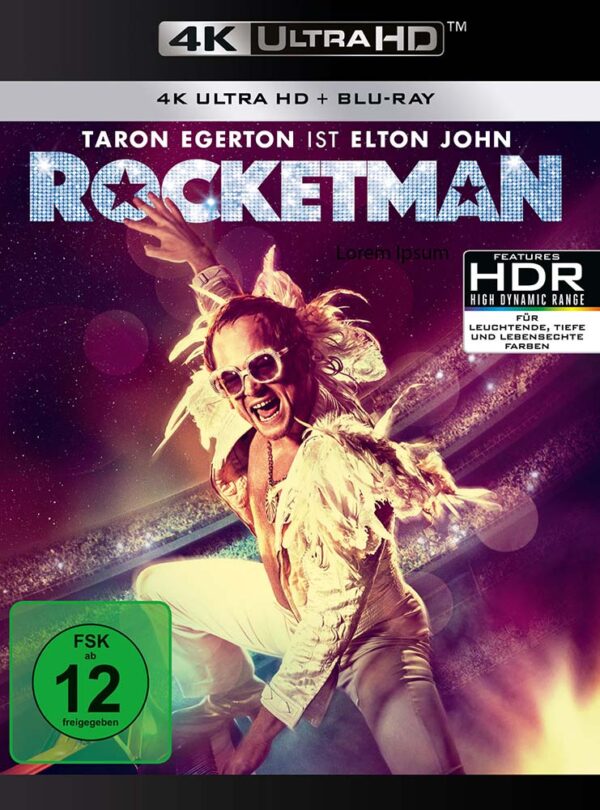
The current Rolling Stones release Goats Head Soup also went through your mixing desk. What are the differences and difficulties in bringing recordings of artist like The Beatles or The Rolling Stones into a new immersive listening experience?
“Every one of them is different, every album is different and every song is different. (…) For The Rolling Stones (…) someone had done some mixing for the album and Mick came in and, in my role as head of audio at Universal, we listened to it together. And it was very clean, it was very precise and he goes: “That’s not very Rock’n’roll is it?” That was because he made it too wide, when you make it too wide you lose the punch and The Rolling Stones, especially this album, kind of needs to hit you in the face. (…)
The Stones album is interesting, because it wasn’t recorded at any stage in its life to be a high-definition audio experience. It’s a band playing in Jamaica, drinking a lot, the microphone is all over the place, just a challenge! So, the original album, when you listen to it, it sounds cool but it’s really Lo-Fi. (…)
Because it’s Rock’n’roll, the frequency responses are huge even when it’s compressed and so, the challenge is to keep that aggression, but (…) make it immersive. Obviously, there’s certain songs which suit that and then there’s songs like “Star star” where you go: “That’s just a Rock’n’roll song!” In that case I want to feel as if the band is performing in a room with me, I want to get as close as I can get to that.”
The new immersive mix on Blu-rayas well as alternative mixes, rare recordings, three unreleased tracks, a live video of the album“TheBrusselsAffair” and a photo- and storybookmake up the Limited Super Deluxe Editionof Goats Head Soup – also available here in our shop.
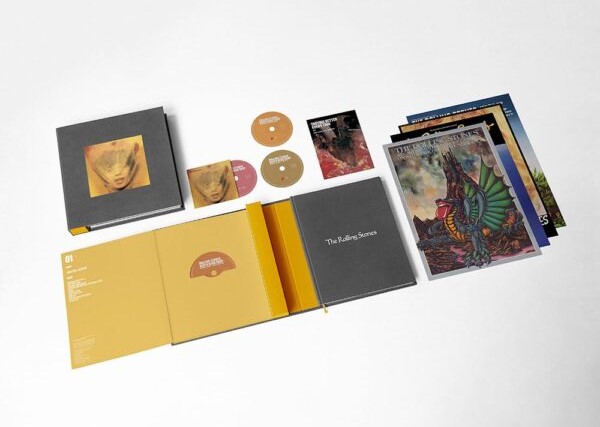
How long does it take from the listening sessions to the final master? What is the process during these remixes in terms of time?
“It depends on the song; we’ll generally do a song a day in stereo. When it’s like The Rolling Stones, The Beatles or other legacy artists, you need to make sure that you’re not making the record worse. (…) It takes about a day to do the stereo and then less time to do the Atmos and 5.1. And then I spend ages revising stuff, because I’m a pain. I’m very laid back as person, but in front of the speakers – some days the people I work with set things up and then I go and change everything.
Sam Okell, who worked with me on The Beatles’ stuff and who is a great engineer, he always goes: “I knew you’d notice that!” And that’s part of the process and that’s going back to your first question: That’s what you miss in lockdown, you miss the collaboration.”
Finally, we’d like to ask you, what you think how music recordings will look like in the future in a world that is going to be more and more digital interactive?
“I’m concerned about people going over the top. There was an engineer at Abbey Road that had eighteen mics on a harp. I don’t believe in that, it’s not in my DNA. I’d put a microphone in front of a harp or maybe a stereo pair of microphones in front of a harp. I tease Sam, who did Rocketman with me, about having microphones too many and I keep unplugging them. Because I don’t want to have all those options, it doesn’t make things sound better. Directness is always good, that’s what we need. If everything sounds disperse you have nothing to hold onto. That’s not how we listen in real life. (…)
What’s improved is playback and speakers and multi-channel, but the recording process actually hasn’t gotten that much better since 1966. And the other thing, that can actually ruin everything, is, you can have a great singer sing into a shure sm58 and sound better than a bad singer sing into a Neumann 48 – that’s a fact. A great selling band is ultimately a great selling band. (…)
Us nerds, we can argue about compressors, microphones and everything else, it’s really the artist who makes a good song good.”

